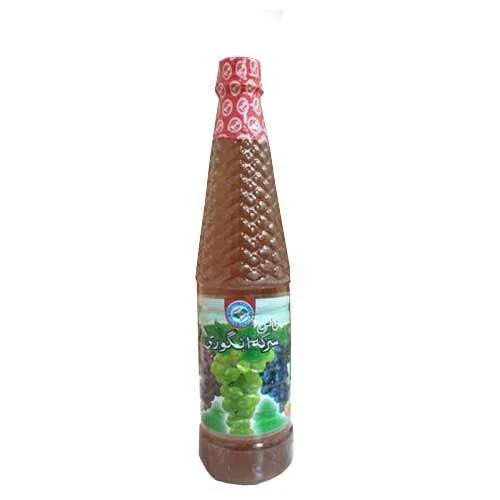Grape Vinegar (Sirka Angoori) سرکہ انگوری
₨ 300 – ₨ 700
Weight Loss
Increases Metabolism
Reduces Skin Redness
Helps Prevent & Treats Infections
Contains Antioxidants
Heals Cuts, Scars, & Burns
Suppresses Appetite
Eases Discomfort of Skin Irritations
- Raw
- Unfiltered
- Unheated
- Unpasteurized
Overview
Grape vinegar has a tangy, acidic flavor with a subtle sweetness derived from the grapes. Its flavor profile can vary depending on the grape variety and the fermentation process. Grape vinegar is made by fermenting the juice of red grapes. The grapes are typically crushed, and the juice is extracted. Then, bacteria called Acetobacter convert the alcohol in the grape juice into acetic acid through a process called acetification. This acetic acid gives vinegar its characteristic sour taste.
Benefits
Grape vinegar contains antioxidants such as resveratrol and flavonoids. These antioxidants help neutralize harmful free radicals in the body, reducing oxidative stress and potentially protecting against chronic diseases.
Vinegar, including grape vinegar, has been studied for its potential to help regulate blood sugar levels. It may improve insulin sensitivity and reduce the glycemic response to carbohydrate-rich meals, making it potentially beneficial for individuals with diabetes or those looking to manage their blood sugar levels.
Grape vinegar has been suggested to have a positive impact on weight management. Its potential effect on blood sugar control and insulin sensitivity may help control cravings, promote satiety, and contribute to better appetite regulation, which can aid in weight management efforts.
The acetic acid present in grape vinegar may promote healthy digestion by stimulating the production of digestive enzymes. It can aid in the breakdown of food and enhance nutrient absorption. Some people find that consuming vinegar before meals can help alleviate indigestion or bloating.
The antioxidants in grape vinegar, particularly resveratrol, have been associated with potential cardiovascular benefits. They may help reduce inflammation, improve blood circulation, and support heart health.
Grape vinegar possesses antimicrobial properties due to its acetic acid content. It may help inhibit the growth of certain bacteria and potentially act as a natural food preservative.
Vinegar may have positive effects on heart health markers, such as reducing cholesterol levels and blood pressure. These benefits may also apply to grape vinegar, although more research is needed.
vinegar may have positive effects on heart health markers, such as reducing cholesterol levels and blood pressure. These benefits may also apply to grape vinegar, although more research is needed.
How To Use
- Salad dressings: Grape vinegar can be used as a base for homemade salad dressings. Combine it with olive oil, herbs, mustard, honey, or other ingredients to create a flavorful dressing for your salads.
- Marinades: Use grape vinegar as part of a marinade for meats, poultry, or vegetables. Its tangy and fruity flavor can help tenderize and add depth to your marinated dishes.
- Sauces and glazes: Add grape vinegar to sauces, glazes, or reductions. Its acidity and flavor can enhance the taste of savory sauces like barbecue sauce or sweet glazes for meats.
- Pickling: Grape vinegar can be used as a pickling liquid for vegetables, fruits, or even eggs. Its acidity helps to preserve and enhance the flavors of the pickled items.
- Deglazing: After cooking meats or vegetables, deglaze the pan with grape vinegar to create a flavorful sauce or pan sauce. The vinegar will help lift the caramelized bits from the pan, adding depth and complexity to the dish.
- Drizzling: Use grape vinegar as a finishing touch by drizzling it over roasted vegetables, grilled meats, or even fresh fruits. Its acidity can brighten the flavors and add a tangy kick.
- Dips and spreads: Mix grape vinegar with other ingredients like olive oil, herbs, garlic, or yogurt to create delicious dips or spreads. It can be used as a tangy component in hummus, tzatziki sauce, or other creamy spreads.
- Culinary experimentation: Grape vinegar can be used creatively in various recipes. Explore its unique flavors by incorporating it into marinades, glazes, dressings, or sauces to add a touch of acidity and fruitiness.
Additional information
| Packing | 250 ml, 800 ml |
|---|









Reviews
There are no reviews yet.